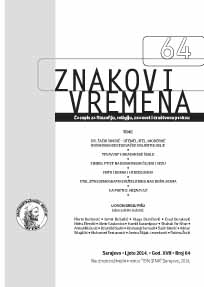Koncept duše u Aristotela, Nietzschea i Schelera
Concept of the soul in Aristotle, Nietzsche and Scheler
Author(s): Anita MilićevićSubject(s): Philosophy
Published by: Naučnoistraživački institut »Ibn Sina«
Keywords: body; soul; hermeneutics; entelechy; form of the body; heterogenity; multiple soul; soul as subject; unity of body and soul
Summary/Abstract: This text concerns about concept of the soul in Aristotle, Nietzsche and Scheler. Starting from Aristotle’s conception of the soul as the first form of the body and entelechy to Nietzsche’s understending of multiple soul to Scheler’s tripartite division on soul, body and the mind. The concept of the soul we followed through philosophical-hermeneutical prism. The soul is the essence of man and like that has been shown in philosophies of these three philosophers. One of the most important concepts is the unity of body and soul; soul is not immortal, it is tied to the body and it is mortal. The soul is dived in the world and makes one with the body. The body interprets the soul and that makes symptoms as different philosophies. Nietzsche’s critique oft he atomistic conception of the soul also meant the critique of the metaphysical conception oft he soul. Philosophical antropology and psychology in Aristotle, Nietzsche and Scheler meant the turn in philosophical thinking.
Journal: Znakovi vremena - Časopis za filozofiju, religiju, znanost i društvenu praksu
- Issue Year: 2014
- Issue No: 64
- Page Range: 63-76
- Page Count: 14
- Language: Croatian

